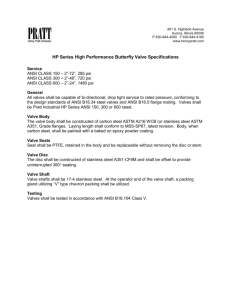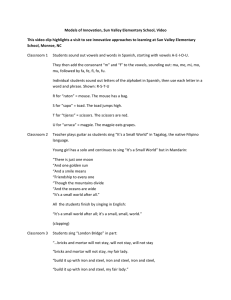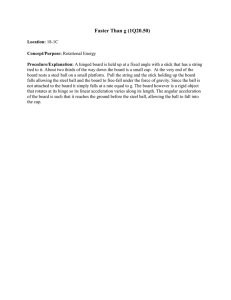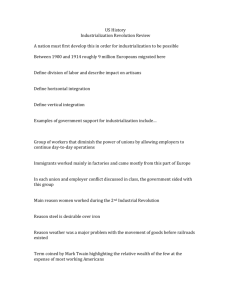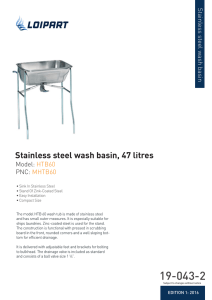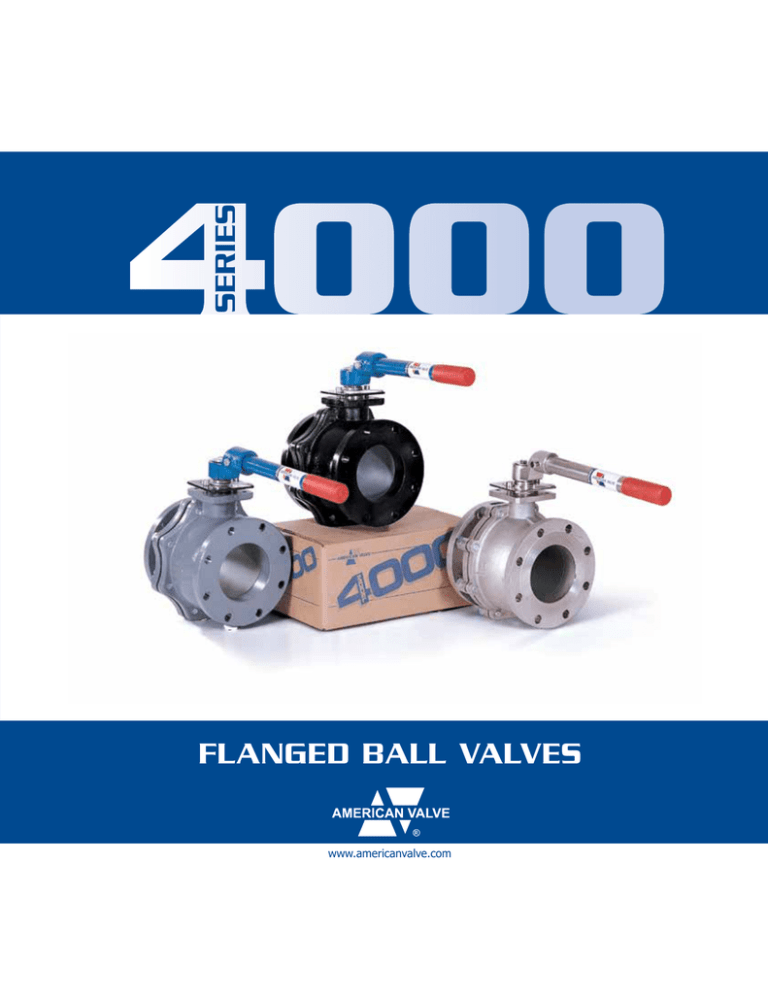
SERIES
4000
FLANGED BALL VALVES
www.americanvalve.com
Industry-Leading Innovation
American Valve commits itself to consistently fulfilling our customers' needs and expectations
by supplying products that are built with confidence and quality. This commitment is accomplished by
achieving the following objectives:
• American Valve ensures continuous
reliability and quality by using welltrained personnel and through the
implementation of a quality system
that meets international standard
ISO 9001.
• American Valve develops and
maintains professional working
relationships in all aspects of its
business and builds customer
confidence by consistently delivering
quality products in a timely manner.
Our goal at American Valve is to be
fully responsive to the customers’
needs, and to operate within a system
which ensures our ability to provide our
customers with quality products today
and for the future.
• American Valve will continue to
pursue a pioneering role in the
industry by supplying products which
focus on the customer's current and
future needs and expectations.
4000 SERIES
Green Building Benefits
ENERGY SAVINGS
Zero Leakage: Valuable hot water or steam
in hydronic heating system is not lost
• Maintains consistent temperature
throughout system
• Huge savings of expensive oil/gas
needed to regenerate loss
WATER QUALITY
• PFA* fused ball
• No VOC’s
• NSF/ANSI 61
• NSF/ANSI 372
PFA* fused ball resists build up thru valve port,
maintaining reliable flow rate and efficient heat transfer.
*PFA is an ingredient commonly branded as Teflon®.
MODEL 4000
Cast Iron Flanged End Ball Valve
Part
Material
1
Body
Cast Iron/A126 Class B
2
Ball
Cast Iron/PFA* Fused
3
Stem
Stainless Steel
4
Gland Plate
Steel
5
Handle
Steel
6
Handle Bracket
Ductile Iron
7
Packing Follower
Stainless Steel
8
Stem Indicator
Steel
9
Handle Bracket Spacer
Steel
10
Stem Stud
Carbon Steel
11
Gland Stud
Carbon Steel
12
Body Stud
Carbon Steel
13
Body Nut
Carbon Steel
14
Handle Bracket Bolt
Carbon Steel
15
Packing
PTFE (Chevron)
16
Body Gasket
PTFE
17
Seat Ring
RPTFE 15% GF
18
Back Seat O-Ring
PTFE
19
Handle Grip
Vinyl Rubber Foam
20
Body Cap
Cast Iron/A126 Class B
DIMENSIONS:
10
10
6
9
8
14
5
19
11
4
7
20
15
16
3
1
18
17
12
2
18
17
13
½
3/
4
1
1½
2
2½
3
4
6
8
10
4.625"
5"
6.5"
7"
7.5"
8"
9"
10.5"
11.5"
13"
A Face to Face
4.25"
B Center of Port to Top
4.25"
4.25"
4.75"
6"
6.5"
7.5"
8.25"
9"
12"
12.25"
13.5"
C Flange Diameter
3.5"
3.875"
4.25"
5"
6"
7"
7.5"
9"
11"
13.5"
16"
11.875"
11.875"
11.875"
12.25"
12.5"
14"
14"
16"
30.5"
30.5"
33.625"
7.875"
D Center of Valve to Handle End
E Port Diameter
0.5"
0.75"
1"
1.5"
2"
2.5"
3"
4"
6"
6"
Bolt Holes
4
4
4
4
4
4
4
8
8
8
12
Weight lbs.
6
7
10
17
24
43
50
77
149
190
309
CV
26
50
100
260
500
750
1245
2500
5470
4150
6700
• A126 Class B Cast Iron Body
• PFA* Fused Solid Ball
• Blow-out Proof Stainless Steel Stem
• Reinforced PTFE Seats
• Face to Face and Flanged Dimensions
conform to ANSI Standard B16.10
which exactly match end to end
dimensions of all cast iron gate valves
and plug valves
• Lockable in Full Open or Closed
Positions
• Mounting Pad for Easy Actuation
• Adjustable Length/Removable Handles
to fit into areas of limited space
• Full Port through 6"
• Certified to meet the requirements of
NSF/ANSI 61 and NSF/ANSI 372
SPECIFICATIONS:
MSS SP-72
ANSI B16.10
FED. SPEC. WW-V-35
AWWA C507-99 Proof of Design Test
RATING:
125 psi WSP
200 psi WOG
353° F
This patented Cast Iron Ball Valve
has been engineered to replace any
IBBM Gate Valve, All Iron Gate Valve,
or Plug Valve.
*PFA is an ingredient commonly
branded as Teflon®.
SAMPLE SPECIFICATION:
Ball valves shall be of the floating-ball design
providing bi-directional, tight shutoff in accordance
with MSS SP-72. The valves shall be rated at
125# WSP/200# WOG. Bodies shall be of cast
iron per ASTM A126 Class B, With ANSI Class
125 flat-face flanges. The interior and exterior of
the body shall be UL certified polyester powder
coated to meet NSF/ANSI 61 and NSF/ANSI
372. The ball shall be PFA infused cast iron,
with a stainless steel blowout-proof stem. The
seats and body seals shall be PTFE. The stem
seal shall be PTFE, externally adjustable
chevron type. Valves shall be equipped with
locking handles as standard. Valves may be
equipped with 2" square operating nuts, manual
gear operators, or pneumatic, electric, or
hydraulic actuators. Valves shall be the Series
4000 as manufactured by American Valve, Inc.
or as approved by the engineer.
MODEL 4000D
Ductile Iron Flanged End Ball Valve
Part
Material
1
Body
Ductile Iron/A536
2
Ball
Stainless
Steel/PFA* Fused
3
Stem
Stainless Steel
4
Gland Plate
Steel
5
Handle
Steel
6
Handle Bracket
Ductile Iron
7
Packing Follower
Stainless Steel
8
Stem Indicator
Steel
9
Handle Bracket Spacer
Steel
10
Stem Stud
Carbon Steel
11
Gland Stud
Carbon Steel
12
Body Stud
Carbon Steel
13
Body Nut
Carbon Steel
14
Handle Bracket Bolt
Carbon Steel
15
Packing
PTFE (Chevron)
16
Body Gasket
PTFE
17
Seat Ring
RPTFE 15% GF
18
Back Seat O-Ring
PTFE
19
Handle Grip
Vinyl Rubber Foam
20
Body Cap
Ductile Iron/A536
DIMENSIONS:
2
2½
3
4
6
8
10
A Face to Face
7"
7.5"
8"
9"
10.5"
11.5"
13"
6.5"
7.5"
8.25"
9"
12"
12.25"
13.5"
B Center of Port to Top
10
10
6
9
8
14
5
19
11
4
7
C Flange Diameter
20
15
16
3
1
6"
7"
7.5"
9"
11"
13.5"
16"
12.25"
14"
14"
16"
30.5"
30.5"
33.625"
E Port Diameter
2"
2.5"
3"
4"
6"
6"
7.875"
Bolt Holes
4
4
4
8
8
8
12
Weight lbs.
25
42
55
78
149
194
318
CV
500
750
1245
2500
5470
4150
6700
D Center of Valve to Handle End
• A536 Grade 65-45-12 Ductile Iron Body
• PFA* Fused Solid Stainless Steel Ball
• Blow-out Proof Stainless Steel Stem
• Reinforced PTFE Seats
SPECIFICATIONS:
MSS SP-72
ANSI B16.5 Raised Face
FED. SPEC. WW-V-35
AWWA C507-99 Proof of Design Test
• Face to Face and Flanged Dimensions
conform to ANSI Standard B16.10
which exactly match end to end
dimensions of carbon steel ball valves,
ductile iron gate valves, and plug valves
RATING:
• Mounting Pad for Easy Actuation
This Ductile Iron Ball Valve has been
engineered to replace any plug valve,
carbon steel ball valve, or gate valve.
• Full Port through 6"
*PFA is an ingredient commonly
branded as Teflon®.
• Lockable in Full Open or Closed
Positions
• Adjustable Length/Removable Handles
to fit into areas of limited space
• Certified to meet the requirements of
NSF/ANSI 61 and NSF/ANSI 372
150 psi WSP
300 psi WOG
366° F
18
17
12
2
18
17
13
SAMPLE SPECIFICATION:
Ball valves shall be of the floating-ball design
providing bi-directional, tight shutoff in accordance with MSS SP-72. The valves shall be
rated at 150# WSP/300# WOG. Bodies shall be
ductile iron per ASTM A536, With ANSI Class
150 raised-face flanges. The interior and
exterior of the body shall be UL certified
polyester powder coated to meet NSF/ANSI 61
and NSF/ANSI 372. The ball shall be PFA
infused stainless steel, with a stainless steel
blowout-proof stem. The seats and body seals
shall be PTFE. The stem seal shall be PTFE,
externally adjustable chevron type. Valves shall
be equipped with locking handles as standard.
Valves may be equipped with 2" square
operating nuts, manual gear operators, or
pneumatic, electric, or hydraulic actuators. Valves
shall be the Series 4000D as manufactured by
American Valve, Inc. or as approved by the engineer.
MODEL 4001
Stainless Steel Flanged End Ball Valve
Part
Material
1
Body
ASTM A351-CF8M
2
Ball
ASTM A351-CF8M/PFA*
Fused
3
Stem
A276-316
4
Gland Plate
AISI 304
5
Handle
ASTM A312 Schd 40
GR 304
6
Handle Bracket
ASTM A351 CF8
7
Packing Follower
A276-316
8
Stem Indicator
AISI 304
9
Handle Bracket Spacer
AISI304
10
Stem Stud
0193-B8
11
Gland Stud
0193-B8
12
Body Stud
0193-B8
13
Body Nut
0193-B8
14
Handle Bracket Bolt
0193-B8
15
Packing
PTFE (Chevron)
16
Body Gasket
PTFE
17
Seat Ring
RPTFE 15% GF
18
Back Seat O-Ring
PTFE
19
Handle Grip
Vinyl Rubber Foam
20
Body Cap
ASTM A351-CF8M
DIMENSIONS:
1½
A Face to Face
10
10
6
9
8
14
5
19
11
4
7
1
2
2½
3
4
6
6.5"
7"
7.5"
8"
9"
10.5"
6"
6.5"
7.5"
8.25"
9"
12"
C Flange Diameter
5"
6"
7"
7.5"
9"
11"
12.25"
12.25"
14"
14"
16"
30.5"
1.5"
2"
2.5"
3"
4"
6"
E Port Diameter
16
3
B Center of Port to Top
D Center of Valve to Handle End
20
15
Bolt Holes
4
4
4
4
8
8
Weight lbs.
16
22
38
49
73
145
CV
260
500
750
1245
2500
5470
• Cast 316 Stainless Steel (CF8M)
• PFA* Fused Solid Stainless Steel Ball
• Blow-out Proof Stainless Steel Stem
• Reinforced PTFE Seats
• Full Opening for Unrestricted Flow
• Lockable in Full Open or Closed
Positions
SPECIFICATIONS:
MSS SP-72
ANSI B16.5 Raised Face
FED. SPEC. WW-V-35
AWWA C507-99 Proof of Design Test
RATING:
• Mounting Pad for Easy Actuation
150 psi WSP
300 psi WOG
366° F
• Certified to meet the requirements of
NSF/ANSI 61 and NSF/ANSI 372
This patented Stainless Steel Ball Valve
with PFA* fused ball has been Engineered
to more effectively resist corrosion and
prolong valve life.
• API 607 Fire Safe Design
• Adjustable Length/Removable Handles
to fit into areas of limited space
*PFA is an ingredient commonly
branded as Teflon®.
18
17
12
2
18
17
13
SAMPLE SPECIFICATION:
Ball valves shall be full port and of the floatingball design providing bi-directional, tight shutoff
in accordance with MSS SP-72. The valves
shall be rated at 150# WSP/300# WOG. Bodies
shall be stainless steel per ASTM A351-CF8M,
With ANSI Class 150 raised-face flanges. The
interior and exterior of the body shall be UL
certified polyester powder coated to meet NSF/
ANSI 61 and NSF/ANSI 372. The ball shall be
PFA infused stainless steel, with a 316 stainless
steel blowout-proof stem. The seats and body
seals shall be PTFE. The stem seal shall be
PTFE, externally adjustable chevron type.
Valves shall be equipped with locking handles
as standard. Valves may be equipped with 2"
square operating nuts, manual gear operators,
or pneumatic, electric, or hydraulic actuators.
Valves shall be the Series 4001 as manufactured by American Valve, Inc. or as approved by
4000 Series
vs. Gate, Plug, and Butterfly Valves
Advantages of 4000 Series
vs. Gate Valves
Quarter turn provides instant shutoff
Full unobstructed opening provides superior
flow rate
Easy to open and close, no cheater bar
required
Positive shutoff- Exceeds Class VI
No bronze seat rings, bronze disc rings or
bronze stems to wear out
Lighter than gate valves, making installation
and handling easier
Advantages of 4000 Series
vs. Butterfly Valves
No disc in waterway to create turbulence
Same ANSI flanged dimensions as gate
valves for easier retrofit
PTFE seats, not Buna N or EPDM
More suitable for steam, petroleum, and
corrosive applications
Handle shows whether open or closed
Main seating surface does not face
upstream pressure in open position
Ball wipes clean during opening and closing
Full opening provides superior flow
characteristics
No bronze parts enables use in all-iron gate
valve applications.
Compact design fits into areas of limited
space.
Throttling is permitted. Open and shut are
not the only working positions.
Low profile design enables easier storage
and shipping.
Can be locked in either open or closed
position.
PFA* fused ball resists corrosion, in a wider
range of applications
Zero wear rate in the open position
Unique packaging prevents damage during
shipping and facilities storage
Easy and inexpensive to rebuild/repair
*PFA is an ingredient commonly branded as Teflon®.
PTFE packing instead of O-ring stem seals
Positive shutoff- exceeds Class VI
Blow out proof stainless steel stem
Advantages of 4000 Series
vs. Plug Valves
Full unobstructed flow
No exposed internal components to catch
and retain debris
No lubrication required to ensure smooth
operation and maintain seals
Lower torque for more efficient and cost
effective automation
Positive shutoff- exceeds Class VI
Applications
for the 4000 Series Valves
Plumbing
Irrigation
Industrial
Pump Isolation
Golf Courses
Mining
Water Main Shutoff
Citrus Groves
Hi-Rise Building Booster Pumps
Farm Fields
BioDiesel and Ethanol Production,
Storage, and Distribution
Drain Lines
Public Parks
Petroleum Blending, Storage, and
Distribution
Lead and VOC Free Materials
contribute to Green Infrastructure
Sports Facilities
Petroleum Loading Facilities
Livestock
Food Processing
Certified to meet the requirements
of NSF/ANSI 61 and NSF/ANSI 372
Water Treatment
Certified to meet the requirements
of NSF/ANSI 61 and NSF/ANSI 372
Plant Utilities
Plumbing Isolation
Power Plants
Building Connections
Air Lines
Pump Stations
Drain, Waste, and Vent Lines
Chemical Feed Lines
Certified to meet the requirements
of NSF/ANSI 61 and NSF/ANSI 372
Wastewater Plants
Digester Aerators
Sludge Processing
HVAC
Boiler Feed
Makeup Water
Distribution of Hot Water or Steam
from Central Plant
Condensate Return
Methane Gas Gathering,
Storage, and Distribution
Distribution and Return of Chilled
Water from Central Chilled Water
Plant
Force Mains
Drain Lines
Lift Stations
Chemical Feed Lines
Drain Lines
Gas
Natural Gas Meter Sets
Propane Gas Storage and
Distribution
More Than Just a Valve
American Valve offers a complete package of
pneumatic, hydraulic and electric actuators, gear
operators and operating nuts for the 4000 series. Our
unique PFA* fused ball and lower operating torques
make the 4000 series an effective alternative to cast
iron gates, carbon steel ball valves, carbon steel gate
valves, and plug valves. Our in-house automation
program provides a fast, cost-effective, and turn-key
solution for your automation needs.
Pneumatic, hydraulic and electric actuators made for
the 4000 series have an unmatched cycle life and are
the industry-wide preference for even the most severe
applications.These actuators offer adaptability to a variety of
process conditions to accommodate your application.
The flexible, modular design of the patented 4000 series
can be used to combine actuators, solenoid valves, limit
switches and other accessories in a variety of applications.
American Valve delivers the 4000 series fully automated
and factory tested under a single manufacturer's warranty.
Standard 2" square operating nuts are available to
effectively satisfy underground requirements.
*PFA is an ingredient commonly branded as Teflon®.
A SPECIAL PACKAGE FOR WHOLESALERS
American Valve has also created unique, sturdy
boxes for the patented family of 4000 ball valves.
This exclusive packaging eliminates potential
shipping damage and offers unparalleled storage
capabilities to wholesalers.
American Valve
PFA* Fused Ball
Our PFA* fused ball is more corrosion-resistant than
balls made with unprotected metal surfaces. Refer
to any manufacturer's chemical resistance guide for
further information.
Our PFA* fused ball inhibits the buildup of lime, calcium, sludge, etc. that accumulates on ball surfaces
and thus prevents premature failure of the valve
seats. Series 4000 valves with Teflon® fused balls
can last up to ten times longer than valves made
with unprotected ball surfaces.
The lubricity of our PFA* fused ball allows for lower
torque ratings in any application.
This feature eliminates ball pitting, prevents build-up,
lowers torque, and stops premature valve failure.
Since the PFA* is actually impregnated .008" into the
solid metal, it can't wear, chip, or flake off.
*PFA is an ingredient commonly branded as Teflon®.
A Look Inside Our Ball
PFA* surrounds the base m
aterial to form a fused
bond to a depth of .008
Additional .004" electrostatic
coating for smoothness.
Together they produce the strength
of steel with the corrosion resistance of PFA*.
Our patented process has gained the best of both
worlds...Strength, Lubricity, and Bonding.
*PFA is an ingredient commonly branded as Teflon®.
Metallurgy
Technical Info for 4000 Series
Minimum
Tensile
Strength
Minimum
Yield Point
Minimum
Elongation
Grey Iron
A126 Class B
31,000 psi
---
0.1%
Ductile Iron
A536 Grade 65-45-12
65,000 psi
45,000 psi
12%
Carbon Steel
A216 WCB
70,000 psi
30,000 psi
22%
304 Stainless Steel
A-351 CF8
70,000 psi
28,000 psi
316 Stainless Steel
A-351 CF8M
70,000 psi
30,000 psi
GREY
IRON
65-45-12
DUCTILE
IRON
WCB
CF8
CF8M
Carbon % (max)
3.5
3.5
0.3
0.08
0.08
Manganese %
0 .5
0 .1
1 .0
1 .5
1.5
Phosphorous %
0.1
0.03
0.04
0.04
0.04
Sulfur %
0 .1
0 .005
0 .05
0 .04
0.04
Nickel %
0.02
0
0.5
8.0
9.0
35%
Chromium %
0 .05
0 .025
0 .04
18-21
18-21
30%
Molybdenum %
0.05
0.002
0.25
-
2-3
Silicon %
2 .1
3 .2
0 .3
2
2
0.005
0.025
-
-
-
Magnesium %
Model 4000 is made of cast iron (ASTM A126 Class B, standard grey iron). Model 4000D is made of ductile iron (ASTM 536, grade 6545-12). Model 4001 is made of stainless steel (ASTM A351 CF8M).
It is useful to understand basic information about ferrous metals (cast irons, steels) and their relationships. 100% pure iron is never used
as a cast metal because it is too soft and weak. When carbon is added, hardness and strength appear. When approximately 0.3% carbon
is added, the resulting alloy is steel. Steel is a strong but difficult ferrous metal to manufacture from a production standpoint. Adding more
carbon (up to about 2%) creates even more production problems. These “semi-steels” are seldom used.
When more carbon is added (between 2% and 3%), white iron is formed. White iron is true cast iron and is easy to produce. The problem
with white iron is that it is very brittle because the carbon exists as iron carbide instead of pure carbon. Iron carbide (Fe3C) is a hard and
brittle compound sometimes referred to as cementite. If white iron is subjected to a lengthy heat treatment, the Fe3C decomposes into
iron and nodules of graphite. The end product is malleable iron.
When approximately 3.5% carbon is added, Fe3C exceeds its solubility in solid iron (the Fe3C is fully absorbed in the iron until there is no
room left. The excess Fe3C is dispersed as graphite flakes). The result is grey iron. Grey iron (standard cast iron) delivers only moderate
strength with almost no elongation because the excess Fe3C flakes act as stress raisers (they make cast iron easy to crack). Since grey
iron is so economical to produce, its use has been widespread for centuries.
Cast Iron with spheroidal graphite (ductile iron) was first produced in 1948. Its chemical composition and percent of carbon is about the
same as grey iron. The transformation to ductile iron occurs when molten grey iron is treated with magnesium. The insertion of magnesium
into the pouring ladle (the process is called inoculation) transforms the Fe3C flakes into spheroids. These spheroids strengthen the metal
by acting as crack arresters instead of crack facilitators. Ductile iron is sometimes referred to as spheroidal or nodular iron.
65-45-12 ductile iron is named for its physical properties (65,000 psi tensile strength, 45,000 psi yield, 12% elongation). Ductile iron
chemically can be manufactured as Ferritic or Pearlitic. In Ferritic mixes, the graphite spheroids are in a matrix of pure iron. In Pearlitic
mixes, the graphite spheroids are in a matrix of pure iron and cementite (Fe3C). The most common grade of ductile is Pearlitic-Ferritic, a
combination of the two. American Valve’s 4000D uses a predominately Ferritic mix (9:1) to take advantage of its high impact resistance
and added tensile strength (80,000 psi).
Except where API 800° F fire safe standards are required for petrochemical refineries, ductile iron is generally preferable to a carbon
steel because WCB has a tendency to flake, whereas ductile iron powders when subjected to liquid erosion. Ductile iron also possesses
50% higher yield strength properties and is more cost effective. Ductile iron castings have a maximum temperature rating of 650 degrees
F. Traditional glass reinforced PTFE seats begin to deform at 360 degrees F.
ASTM A536-70 (MIL SPEC D-4512) requires each casting to be marked by its foundry heat number. Each heat is chemically tested prior
to magnesium inoculation and also afterwards. Chemical certification by heat number is available upon request.
Standard cast steel (carbon steel) uses the symbol WCB and is defined under ASTM A-216. It contains a maximum of 0.3% carbon.
Stainless steel (ASTM A-351) has carbon levels even lower than WCB (0.08% maximum) making its production more costly. 304 Stainless
Steel (CF8) adds 8% nickel, about 20% chromium, and a little more silicon. 316 stainless steel (CF8M) adds 2-3% molybdenum to the
above. The addition of chromium, nickel and molybdenum enhances corrosion resistance, allowing CF8M to be utilized in a wide variety
of chemical, petrochemical, and corrosive environments.
Operating Torques
for 4000 Series Ball Valve
Size
Torque (ft. lbs)
½"
10
¾"
10
1"
10
1 ½"
20
2"
35
2 ½"
48
3"
62
4"
130
6"
260
8"
360
10"
535
The actual amount of torque required to operate a valve is dependent upon many variables,
such as line pressure, temperature, type of fluid, and frequency of operation. This table is
based on average breakaway torque requirements for a valve handling a clean, particle-free
liquid such as water. The following chart includes a safety allowance for service conditions.
The torque figures listed should be further adjusted for dry or special service conditions. For
fluids with high solids or abrasive content, consult factory for recommendations.
GEAR OPERATOR DIMENSIONS:
Size
1 ½"- 4"
6"-10"
A
B
6"
6"
C
7"
7"
D
3.875"
3.875"
E
4.75"
4.75"
F
2.375"
2.375"
G
10.5"
7.75"
H
3"
3"
I
2.75"
J
1.75"
DH
0.79"
2.75"
1.75"
0.79"
Ratio
TOFP*
9.875"
1:30
515
11.875"
1:50
885
* Torque Output Foot-Pounds
MOUNTING PAD DIMENSIONS:
Size
A
B
C
D
E
F
G
H
J
K
L
M
N
½
2.37
1.75
1.565
0.57
1.14
0.57
1.14
0.5
1.5
2 x M8
4 x .25UNC
0.31
0.67
¾
2.37
1.75
1.565
0.57
1.14
0.57
1.14
0.5
1.5
2 x M8
4 x .25UNC
0.31
0.67
1
2.37
1.75
1.565
0.57
1.14
0.57
1.14
0.5
1.5
2 x M8
4 x .25UNC
0.31
0.67
1½
3.62
2.746
2.323
0.985
1.97
0.985
1.97
0.825
2.1
2 x M12
4 x M8
0.47
1.495
2
3.62
2.746
2.323
0.985
1.97
0.985
1.97
0.825
2.1
2 x M12
4 x M8
0.47
1.495
2½
4.725
3.74
2.957
1.418
2.835
1.418
2.835
1.1
2.4
2 x M12
4 x .4375UNC
0.665
1.81
3
4.725
3.74
2.957
1.418
2.835
1.418
2.835
1.1
2.4
2 x M12
4 x .4375UNC
0.665
1.81
4
4.725
3.74
2.957
1.418
2.835
1.418
2.835
1.1
2.4
2 x M12
4 x .4375UNC
0.665
1.81
6
5.16
4.725
3.465
1.733
3.465
1.733
3.465
1.775
2.75
2 x .5UNC
4 x .5UNC
1.06
2.205
8
5.16
4.725
3.465
1.733
3.465
1.733
3.465
1.775
2.75
2 x .5UNC
4 x .5UNC
1.06
2.205
10
5.16
4.725
3.465
1.733
3.465
1.733
3.465
1.775
2.75
2 x .5UNC
4 x .5UNC
1.06
2.205
Dimensions and weights are given as approximates;
consult factory for details.
Industry-Leading Innovation
www.americanvalve.com
ISO 9001 Registered
© 2016 American Valve, Inc, all rights reserved
January 2016 Edition

